Victor Ballesteros first caught my attention in October of 2008. I was writing a story about the Dick Collins Firetrails 50-mile race for Trail Runner, and I knew I should focus on him because he had won it the previous year as a 50-mile rookie with the third fastest time in the event’s history. Given his crazy long goatee and distinctive jewelry, it wasn’t hard to keep my eyes on Victor, even as hunky Hal Koerner edged him out and Victor finished second in 6:50.
In the four years since, Victor has emerged as one of the Bay Area’s top ultrarunners, and I’ve always found him to personify the sport’s friendly, offbeat vibe. When I heard earlier this year that he was designing and selling a new product for runners—a specialty gear bag for use as a drop bag at aid stations—I knew it had to be good, and I wanted to spread the word about his new venture, Victory Sportdesign. I love a well-designed bag or pack for running and travel.
Victor is an artist and musician who lives in San Rafael, just turned 42, and won all of his races so far in 2012: the Jed Smith 50K, Ruth Anderson 100K and Silver State 50M. Here’s our conversation:
Me: Tell me the story of the trouble you had with your drop bag in the 2009 Western States 100, which inspired the Victory Bag.
Victor: Mark Gilligan of Ultra Signup fame paced me that year. It was my first 100, and I had never used a drop bag. He lent me some small duffel bags, and they were awful. It took way too much time to get into them and find things. Stuff was getting caught onto other things, and mind you I didn’t have a ton of stuff in there. Some stuff actually seemed to disappear! So as the day progressed and I got increasingly tired, I had a harder time focusing on finding what I needed in those bags.
So, afterwards I went looking for a bag that I thought would suit my needs better, and I found nothing. I have an art and design background and love solving problems, so I sat down and created something that I could want and use. After a few prototypes, some runner friends saw what I was doing and loved it.
It was actually a really tough decision to go full bore and launch a business out of it, because I knew it would be a grassroots effort and there are a lot of runners out there who still like their plastic bags. But, the bottom line is that these bags work. I spent a year and a half dragging it through the mud, packing my lunch in it and getting all kinds of feedback regarding what worked and what didn’t. It was really important for me to focus on creating something simple, durable and with utility that not just myself, but others could benefit from as well. In addition, I knew that if I didn’t do it, someone else would, and in the end it’s really like showing up or not to a race. If you don’t follow through, succeed or not, you’ll never know your full potential and what could be.
Let’s talk about the anatomy of a drop bag. Why won’t any old duffel do?
Simple: A drop bag has to make everything inside accessible with zero fuss in finding what you need. Duffel bags, backpacks and plastic bags are all big nebulous holes where everything gets mixed up and buried.
It also shouldn’t be overly complicated. Originally, I decided to design the largest of the three Victory Bags using the “regulation” dimensions for Western States 100 because it was a good place to start. But then after using it, it totally made sense. It was large enough to pack essentials but small enough to prevent over-packing. I usually don’t pack a lot, but when I do, I like to know where everything is at a glance. My motto is get in, get out, get moving!
Has anyone mentioned that your bag looks like it could double as a super-duper diaper bag?
Yes! As a matter of fact, way back when I was making the first prototype, UltraRunning magazine’s Lisa Henson mentioned that she had looked at diaper bags for a workable drop bag, and my design had some of those elements. I really loved the fact that what I was trying to create had multi functions and could be used just about anywhere from boats to running to babies!
When you’re racing an ultra, what are the must-haves that you pack in your drop bag?
Mandarin Orange GU, Gin-Gin’s, S-Caps, Nuun, headlamp, socks, sleeves, bottle with a mix of super diluted, secret electrolyte drink, love.
Any other gear-related problems you’ve had while racing or running?
I recently ran at Silver States 50 miler, and my fully charged Garmin 305 died on me 20 seconds into the race! It was an interesting experience, since I had to essentially forget my acquired reliance on technology and run by pure instinct.
Without any clue of time, even though I checked in with every aid station along the course, I totally fell behind on my nutrition intake and suffered for the last 12 miles. Fortunately, things worked out—nothing a little oxygen, lemonade and paramedics couldn’t fix. I have to include giving a special shout-out and thanks to the super fantastic Rod Bien for not only being a hard-core competitor that day, but also checking in with my sorry condition and getting the paramedics to help me out. Perhaps next time I should include an extra watch in my Victory Bag, which, by the way, worked perfectly throughout the race.
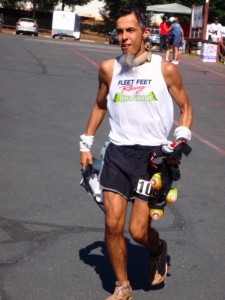
Victor running the Western States 100 Mile Endurance Run in 2009. At aid stations, "my motto is, 'Get in, get out, get moving!'"
How are you marketing the bag, and is it available in any stores or just online?
Right now I’m only two months out of the gate. The large bag, the BEAR 1, is available on my website www.victorysportdesign.com and at the Western States 100 online store with a cool, modern-design Western States logo on it. The next step is to get it into retail stores as well as other online retailers. Any interested readers with a shop can reach me through the website!
The other two models, the COUGAR 1 and COYOTE 1, are still in production. The BEAR 1 is the largest of the three. The COUGAR 1 is medium and the COYOTE 1 is small. Essentially, each is half a size smaller then the first (hence the animal names) and capable of fitting inside one another. It was fun when the time came to give an identifying name to each bag. After a while, I realized that there was something similar about their comparative sizes and to that of the same animals I’ve actually seen out on the trails. So, it was nice to find more personal meaning in the process. I anticipate they’ll be ready before the end of the year and priced according to size relative to the BEAR 1. [Note: The Bear costs $59.90 plus shipping and tax, which totals about $76.]
When you’re not running or developing Victory Sportdesign, what do you spend your time doing?
First and foremost, trying to spend time with my most amazing wife Jena. Without her and her awesome family, I wouldn’t be doing any of this. Second, sleeping. Third, singing and playing guitar with an original funk/rock band that used to be called Atomatronic, but is now looking for a new name—as well as in a kick-ass heavy metal cover band called Rough-Mix, perhaps to be looking for a new name as well.
Your site as a link to Community Action. Tell me about that.
What’s next on your race calendar and how’s your training going?
Despite the hours of sleep lost trying to put together a new business, the training’s been going well. I’ve been trying to mix my calendar up a bit this year by finding various adventures. Aside from my favorite occasional event, the Beer Mile, I’ll be running the single Dipsea (7.2 miles) in Marin and then a real long run at the Tahoe Rim Trail 100 miler, followed up three weeks later by a “Fastest Known Time” attempt of the complete Tahoe Rim Trail 165 mile loop with Gary Gellin, Leigh Schmitt, Jean Pommier, Adam Hewey and maybe Ben Lewis if he can get an injury sustained earlier in the year worked out. It’ll be interesting to see what happens as we try to accomplish this as a team. Hopefully, we’ll get some good documentation of the experience, or at least walk away with a couple of good stories to share when we all grow up.
Thanks, Victor, and good luck with your new venture!

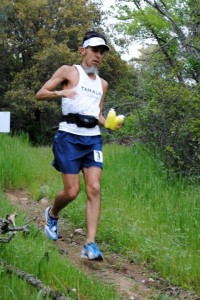
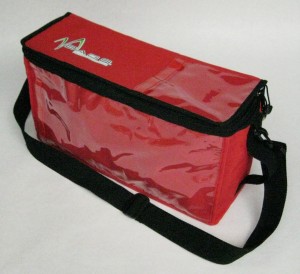
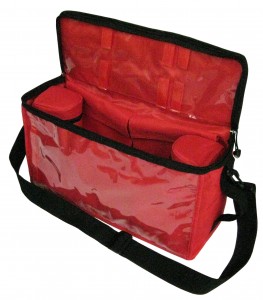
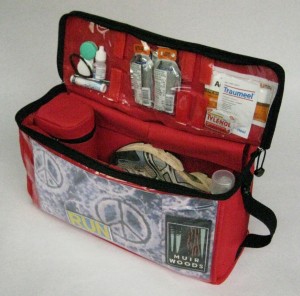
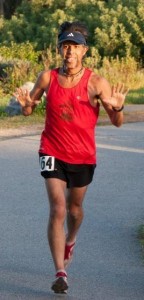
I like the idea of a specific drop bag that can be easily carried and hold items in an organized fashion. Furthermore, it stands out, which makes it easier to identify.